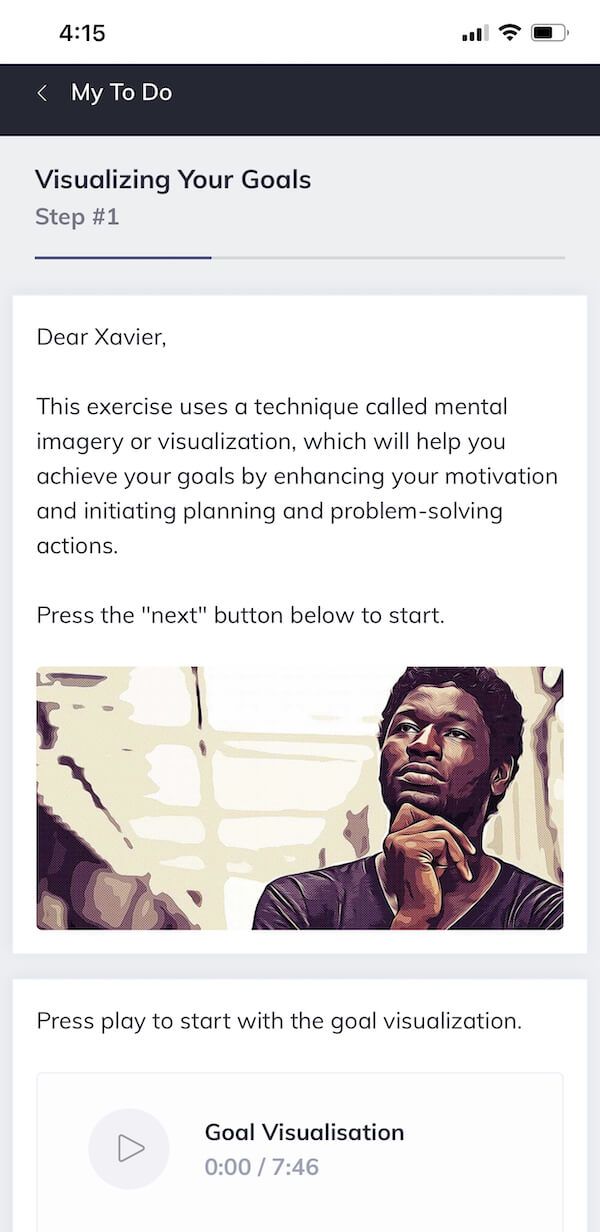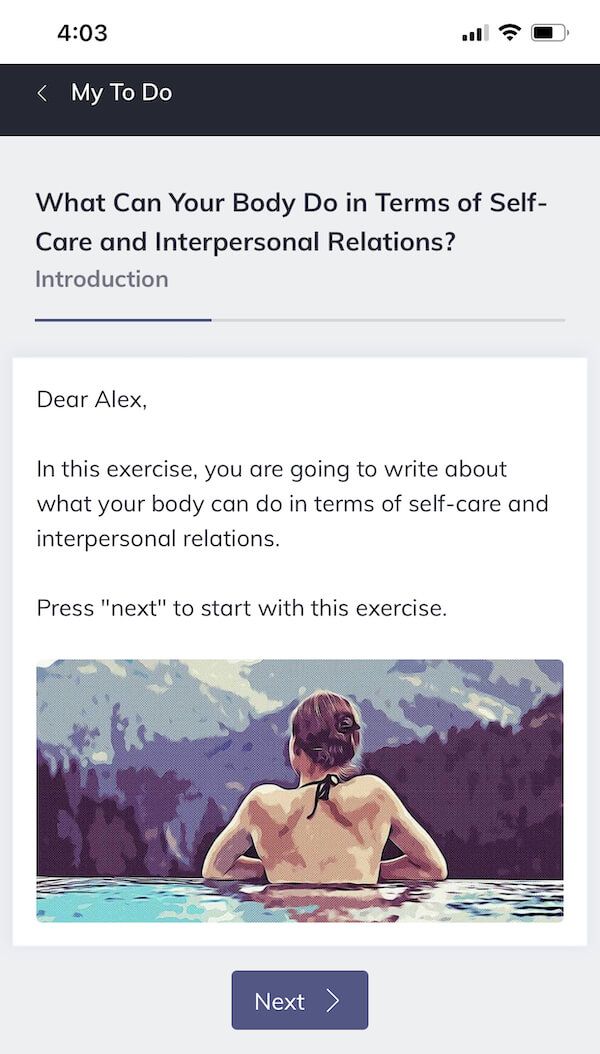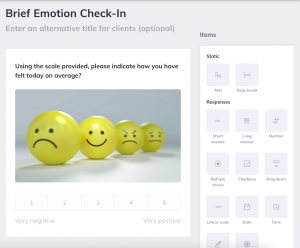15 Coaching Templates and Samples for Life-Changing Sessions
 Standout coaches often have many traits in common, including talent at active listening and a rich well of life experience from which to draw when inspiring their clients.
Standout coaches often have many traits in common, including talent at active listening and a rich well of life experience from which to draw when inspiring their clients.
And yet, it doesn’t matter whether you’re the best listener in the world or have personally scaled Mount Everest.
Even the best coaches need to work from a plan.
In what follows, we’ll provide you with 15 templates and samples you can use to craft concrete, actionable coaching plans that help your clients achieve life-changing transformations during their time with you.
Before you continue, we thought you might like to download our three Positive Psychology Exercises for free. These science-based exercises will explore fundamental aspects of positive psychology including strengths, values, and self-compassion, and will give you the tools to enhance the wellbeing of your clients, students, or employees.
This Article Contains:
Writing a Coaching Plan: 3 Templates
Coaching plans are critical for maintaining and documenting the progress of your coaching sessions (Olubiyi, 2019). These plans provide clarity for both the coach and coachee in several important ways (adapted from Johnson, n.d.).
- They consolidate collected information and establish major areas for development.
- They facilitate the setting of SMART goals with target dates to maintain accountability.
- They create a basis upon which to pivot or adjust existing goals.
- They point the coachee toward relevant resources, such as media, books, or other professionals.
- They establish milestones that, when accomplished, may be highly motivating for the coachee.
By keeping these goals in mind, you can design effective coaching plans that help drive progress in the coaching relationship.
To this end, let’s look at three useful templates to identify growth focus areas in your coaching plans.
In several of these examples, we’ll draw on activities from the comprehensive coaching tool Quenza, which allows coaches to digitize and automate several aspects of a coaching practice. This digitization takes the form of web-based activities, such as assessments, reflections, and evaluations, that coaches can design and clients can complete using their own iOS or Android devices.
If you’re interested, you can access and experiment with any of these activities yourself by taking advantage of Quenza’s 30-day trial for just one dollar.
Now, on to the templates.
The Best Possible Self
When many clients begin coaching, they report feeling ‘stuck’ but are uncertain about the specific changes they’d like to make in their life.
The Best Possible Self exercise is a simple, 10-minute exercise to help your clients gain clarity about their ideal life and guide the development of a coaching plan.
The exercise begins by inviting your client to set a stopwatch or timer for 10 minutes. The client is then invited to write about what life would look like if they had performed to the best of their abilities and achieved all they wanted in their life. This visualization thereby creates an image upon which to set goals.
Life Domain Satisfaction
Another common situation in coaching relationships is when a client begins by reporting dissatisfaction in one or more life domains.
The Life Domain Satisfaction assessment is a powerful tool to help you and your clients discover the extent to which they are satisfied with various life domains.
The exercise invites your client to reflect on their satisfaction across 16 different domains of life, such as family, education, and standard of living. You and your client can then reflect on the responses to identify strengths and areas for growth.
Basic Needs Satisfaction in General Scale
For an especially high-level assessment of a client’s life satisfaction, you can assess their satisfaction of basic core needs.
The free Basic Needs Satisfaction in General Scale is a science-backed, 21-item scale assessing the degree to which your clients experience satisfaction of their three core needs: autonomy, competence, and relatedness (Ryan & Deci, 2000).
All items are rated on a scale from 1 (not true) to 7 (very true), and example items from the scale include (Gagné, 2003):
- I feel like I am free to decide for myself how to live my life.
- Often, I do not feel very competent.
- People in my life care about me.
The results of this instrument are valuable for facilitating discussion about where and in what contexts clients experience the most (or least) satisfaction and how they might increase life satisfaction across different domains.
3 Samples and Templates for Your Coaching Sessions
Now that you have a few templates to aid you in exploring your clients’ desired future selves and areas for growth, let’s look at three more templates to help you design a motivating coaching plan with these desired futures in mind.
Goal Visualization
Mental imagery of future events can help people “envision possibilities and develop plans for bringing those possibilities about” (Taylor, Pham, Rivkin, & Armor, 1998, p. 429).
Quenza’s Goal Visualization audio exercise is a powerful activity designed to strengthen your client’s motivation in the lead-up to pursuing a goal or starting a plan of action.
This exercise comprises eight minutes of guided imagery that invites the listener to consider a goal they’d like to accomplish within a year.
In the exercise, the listener is encouraged to imagine themselves progressing forward in time and consider what taking steps toward goal achievement might look and feel like at different time points. By doing so, they will energize their conscious and unconscious mind to take gradual steps toward their goal, increasing motivation.
Self-Contract Template
Another way to increase our motivation to make beneficial life changes is by completing a self-contract.
Quenza’s Self-Contract Template is a useful agreement your clients can complete to make a signed commitment toward positive change.
In particular, the contract template invites your client to set a clear goal, pick a deadline by which to complete the goal, and note the specific reasons why it is personally important to achieve the goal. Again, explicitly exploring their reasons for pursuing this goal will help keep them motivated when they come up against challenges.
Goal Planning and Achievement Tracker
Tracking progress toward the accomplishment of big goals is another strategy to keep us motivated as we pursue them.
For a useful tool to help track progress toward goal achievement, take a look at the free Goal Planning and Achievement Tracker worksheet.
This simple worksheet invites your client to set goals at the start of the week. Once they set their goals, they then note their daily progress toward achieving the goals in a series of cells that correspond to each day of the week.
Life and Health Coaching: Top 3 Templates
Some people seek the support of a coach to guide them in their pursuit of a range of personal or health-related goals.
Goals such as these may center around weight loss, health-related habits, or self-care, just to name a few.
Here are three useful templates for your life coaching practice to support your clients looking to make lifestyle-related changes.
Creating a Positive Body Image
How we feel about our bodies can play a significant role in determining how we feel about ourselves as a whole and the confidence we project into the world.
For your clients looking to change their self-image as it relates to their body, take a look at the Creating a Positive Body Image pathway on Quenza.
This activity pathway spans several days and invites your clients to think about their body in terms of its functionality and what it can do for them. This serves to shift your client’s focus from limitations or dissatisfaction with physical appearance to cultivate a friendlier relationship with their body.
Distinguishing Physical from Emotional Hunger
Enjoying delicious food is one of life’s many pleasures. But our relationship with food can grow complicated when we eat for reasons other than hunger.
If your client is looking to change their relationship with food, consider sending them the Distinguishing Physical from Emotional Hunger reflection exercise on Quenza.
The reflection begins by inviting your client to think about and list self-soothing activities besides eating that they can engage in when experiencing challenging emotions. They are then encouraged to identify where in their body they experience the physical sensation of hunger and learn to distinguish between physical versus emotional hunger cues.
The Fourteen-Day Commitment
The shift toward a healthier lifestyle typically requires that we change our habits. These habits can be small behaviors surrounding how we eat, sleep, and stay active.
For clients looking to improve their lifestyle habits, check out this free Fourteen-Day Commitment chart.
This chart is sectioned into columns that probe the duration and type of exercise your client undertakes, the amount of sleep they are getting, and the quality of the food they eat. The thinking is that by actively tracking behaviors for 14 days, your clients can become more aware of the micro-behaviors that contribute to or detract from their goal to lead a healthier lifestyle.
How to structure your coaching sessions – Coach Ajit x Evercoach
3 Templates for Your Coaching Program & Classes
Many coaches will draw on principles from disciplines like positive psychology to develop psychoeducational content, lessons, or workshops as part of their coaching program.
If this is you, here are three useful templates you can use to deliver life-changing lessons or classes, either in groups or one-on-one.
Getting to Know One Another Exercise
If you’re running an activity or class in a group, you may find it useful to begin your session with an icebreaker activity. For something a little out-of-the-box that warms up people’s active listening skills, take a look at our free Getting to Know One Another Exercise.
To begin, get participants to form a circle and pair people up with someone they do not know very well. Next, each person in the pair describes one of their biggest blunders, while the other person attempts to remember as many details about the story as possible.
After going around the group and having each listener share the story they heard, the exercise repeats but with new pairs and a focus on views about the shared environment (e.g., workplace, team environment, etc.), helping bring the focus to the context of the coaching session.
20 Guidelines for Developing a Growth Mindset
People with a growth mindset are described as:
“individuals who believe their talents can be developed (through hard work, good strategies, and input from others).”
Dweck, 2016
Inherent in the process of being coached is a focus on learning and development. Therefore, a good starting point for any coaching relationship may be to educate your clients about the benefits of a growth mindset.
For a useful pre-packaged lesson on the topic, take a look at the 20 Guidelines for Developing a Growth Mindset lesson on Quenza.
This lesson neatly summarizes the difference between a fixed and growth mindset, includes a brief video lesson on the neurology of the growth mindset, and details 20 actionable guidelines to help your clients move toward a growth mindset.
Pushing the Ball Underwater Metaphor
When we’re experiencing negative emotions and thoughts, our automatic reaction may be to avoid or suppress them. However, the trouble with this approach is that trying to suppress negativity is much like trying to push a ball underwater – it will quickly bob back up again.
For an illustrated lesson and reflection applying this metaphor of the ball underwater, check it out in Quenza’s pre-loaded Expansion Library.
Overall, this metaphor and lesson will help your clients understand how acceptance rather than control might be a better way to deal with negative experiences, helping your clients get in touch with all their thoughts and emotions, not just the positive ones.
A Look at Quenza: Top 3 Tools for Coaches
You’ll note that several of the templates we’ve explored have been drawn from the psychoeducational coaching platform Quenza.
Quenza is a user-friendly online coaching platform for coaches and other helping professionals that helps you automate and scale aspects of your coaching practice at all stages of the coaching relationship.
The same team who created PositivePsychology.com designed the platform, with the help of the wider positive psychology community. The platform includes a range of science-backed tools designed to keep your clients on track while saving you time and resources.
Let’s look at three top coaching tools within the platform now.
The Activity Builder
All the content that coaches prepare in Quenza is designed using the platform’s intuitive drag-and-drop Activity Builder.
The Activity Builder allows coaches to create sequences of coaching questions and multimedia that clients engage with using their Android or iOS device. These sequences can form various lessons, reflections, assessments, or homework activities, and they can include written content, videos, and audio.
For instance, pictured above, a coach is designing a simple emotion reflection that their client can complete by tracking their mood on a five-point scale.
This reflection may then be followed by an open-ended response question that asks the client to note the dominant emotions they have experienced throughout the day or drivers of their present mood. Alternatively, it may be followed by a video lesson or soothing guided audio meditation.
Regardless, the Activity Builder takes the complexity out of the design and digitization process so that the coach can focus on preparing activities that help the client meet their agreed-upon goals.
The Expansion Library
If you’re just starting your coaching practice and are unsure where to begin, Quenza’s Expansion Library is a great place to start.
Quenza includes an extensive library of pre-loaded science-based activities and pathways that are widely used by members of the positive psychology community. This library is continuously growing, with activities and pathways focusing on topics like body image, gratitude, and goal setting.
Likewise, all activities within the library are fully customizable and can be used as templates to design activities that cater to your clients’ specific needs, giving you complete flexibility.
Leading security features
As part of the coaching relationship, clients will inevitably share personal data and information with the coach. When this is done digitally, the coach must take steps to ensure this information is kept safe and secure.
Quenza was designed with the latest data protection and security laws at its heart, making it both HIPAA and GDPR compliant. All identifying information and responses in the platform are safely and securely stored using top-level AES 256-bit encryption and personal PIN codes. Yet, all this information remains easily accessible to you and your clients via any device at any time.
A Take-Home Message
Even the best coaches need a plan and guidance. Thankfully, with the many resources available through PositivePsychology.com and online coaching communities, there is little reason to run your practice in a bubble.
Likewise, if you’re busy or unsure how to get started with your practice, there is no shortage of pre-prepared templates, activities, and coaching plans you can adapt to your practice and coaching style.
We hope you’ve found some templates presented here valuable. And if you’ve tried any for yourself, let us know about your experience using them in the comments. We’d love to hear from you.
Also, remember, you can try all of Quenza’s features for yourself by taking advantage of the platform’s 30-day trial for just $1.
We hope you enjoyed reading this article. Don’t forget to download our three Positive Psychology Exercises for free.
- Dweck, C. (2016, January 13). What having a “growth mindset” actually means. Harvard Business Review. Retrieved from https://hbr.org/2016/01/what-having-a-growth-mindset-actually-means
- Gagné, M. (2003). The role of autonomy support and autonomy orientation in prosocial behavior engagement. Motivation and Emotion, 27(3), 199–223.
- Johnson, J. (n.d.). 3-Step coaching model. UNT Health Science Center. Retrieved from https://www.unthsc.edu/administrative/wp-content/uploads/sites/23/Coaching-With-ICF-Compentencies-3-Step-Process.pdf
- Olubiyi, M. K. (2019). A sample coaching plan for your coaching practice. Coaches Training Blog. Retrieved from https://coachestrainingblog.com/becomeacoach/coaching-plan-for-your-coaching-practice/
- Ryan, R. M., & Deci, E. L. (2000). Self-determination theory and the facilitation of intrinsic motivation, social development, and well-being. American Psychologist, 55(1), 68–78.
- Taylor, S. E., Pham, L. B., Rivkin, I. D., & Armor, D. A. (1998). Harnessing the imagination: Mental simulation, self-regulation, and coping. American Psychologist, 53(4), 429–439.
Let us know your thoughts
Read other articles by their category
- Body & Brain (49)
- Coaching & Application (57)
- Compassion (26)
- Counseling (51)
- Emotional Intelligence (24)
- Gratitude (18)
- Grief & Bereavement (21)
- Happiness & SWB (40)
- Meaning & Values (26)
- Meditation (20)
- Mindfulness (45)
- Motivation & Goals (45)
- Optimism & Mindset (34)
- Positive CBT (28)
- Positive Communication (20)
- Positive Education (47)
- Positive Emotions (32)
- Positive Leadership (18)
- Positive Parenting (4)
- Positive Psychology (33)
- Positive Workplace (37)
- Productivity (16)
- Relationships (46)
- Resilience & Coping (36)
- Self Awareness (21)
- Self Esteem (38)
- Strengths & Virtues (32)
- Stress & Burnout Prevention (34)
- Theory & Books (46)
- Therapy Exercises (37)
- Types of Therapy (64)








What our readers think
Very helpfully and am learning all about coaching and goals. thanks.
It’s been absolutely helpful!
Thank you!
Absolutely helpful for me as I embark on a coaching practice
This was very helpful. Thank you for providing this information.
Thank you